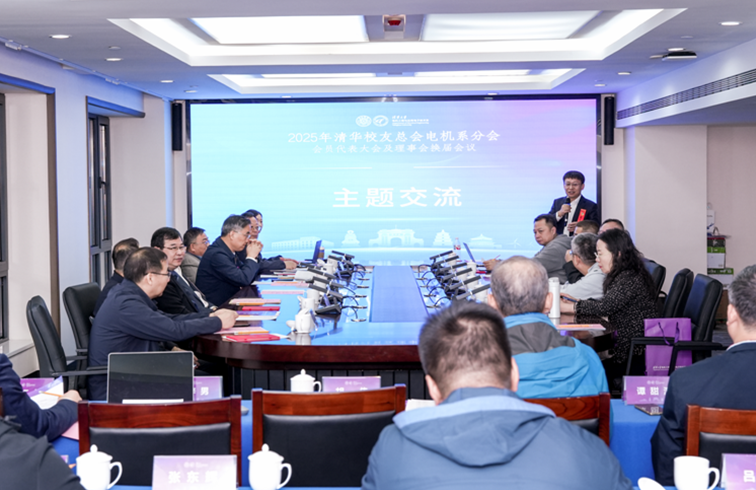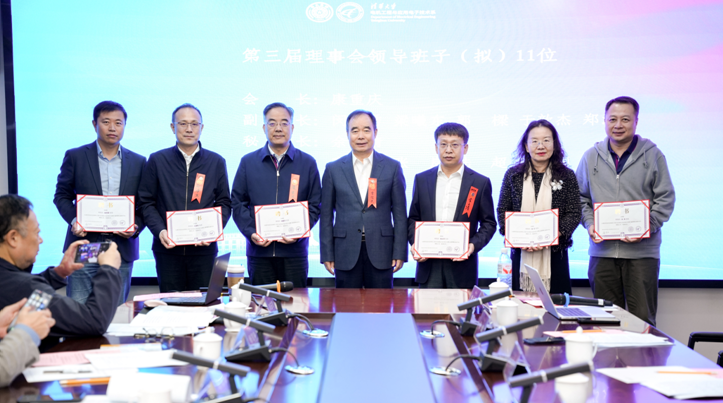
On October 18, the first meeting of the Third Council of the Tsinghua EEA Alumni Association was successfully held in Xi’an, Shaanxi. Ji Junmin, Deputy Director of the Tsinghua University Board of Trustees and Vice President of the Tsinghua Alumni Association, and members of the new EEA Branch Council gathered to embark on a new chapter of branch work, conducting in-depth discussions on leadership elections, core agenda items, and future work planning. The meeting was hosted by Yu Zhanqing, Deputy Party Secretary of the Department of Electrical Engineering and Applied Electronics (EEA).
After prior deliberation, democratic recommendations, and review by the preparatory working group, the meeting announced the proposed leadership team members. Council members reviewed and approved the leadership team list by a show of hands. Kang Chongqing was appointed as President; Guo Liang, Liang Xidong, Min Yong, Yu Xinjie, and Zheng Zedong as Vice Presidents; Yu Zhanqing as Secretary-General; and Zhang Lan, Gao Hong, Lu Chao, and Pang Qingguo as Deputy Secretaries-General. This marked the formal establishment of the leadership structure of the Third Council of the branch.

Issuance of Appointment Letters
Ji Junmin presented appointment letters to the present leadership team members of the council.
In addition, the meeting reviewed the revised version of the Management Measures of the Tsinghua EEA Alumni Association. The revised version, aligned with the branch’s development and evolving alumni needs, optimized and improved organizational structure, working mechanisms, and member services, further clarifying the norms and direction of branch operations. After deliberation by all representatives, the revised version was unanimously approved.
During the agenda review session, the meeting discussed core topics including the branch’s recent key work plans, optimization of alumni service mechanisms, and preparation of academic exchange activities, and conducted votes on the relevant proposals. Council members, drawing on their expertise and understanding of alumni needs, actively offered suggestions, proposing constructive ideas on strengthening alumni network building, improving service precision, and promoting industry-academia-research collaboration. After thorough discussion and democratic voting, consensus was reached on all agenda items, providing clear guidance for the branch’s subsequent work.
During the meeting, Kang Chongqing, President of the Third Council of the EEA Branch, delivered a speech. He first expressed gratitude for the trust and support of all council members and emphasized that the new council carries the important mission of inheriting the branch’s fine traditions and promoting innovative development of alumni work. In his speech, he reviewed the development history of the EEA Branch, acknowledged the contributions of previous councils in uniting alumni and supporting disciplinary progress, and proposed the work direction of the new council in the context of the ongoing transformation of the power industry and new requirements for university talent cultivation: First, to continuously deepen the principle of “serving alumni, serving the alma mater, serving society,” improving alumni contact mechanisms and building more precise communication platforms for alumni across different fields and generations; second, to strengthen coordination and linkage with the EEA, promoting deep integration of alumni resources with disciplinary development and research innovation, supporting breakthroughs in key technologies in Electrical Engineering; third, to focus on national energy strategic needs, organizing industry forums, technical seminars, and other activities to guide alumni in contributing their expertise to energy transition, power safety, and related areas.
The first meeting of the Third Council not only completed the formation of the leadership team and deployment of core work but also consolidated consensus and strength among the new council members. Moving forward, under the leadership of the Third Council, the branch will adopt more pragmatic measures and provide more efficient services to connect the broad EEA alumni network, injecting greater vitality into the development of the alma mater’s disciplines, industry innovation, and national energy initiatives.

















 News & Events
News & Events